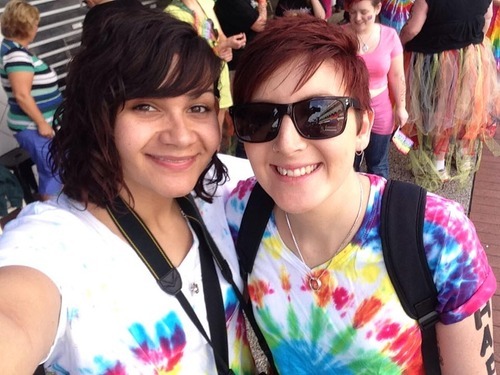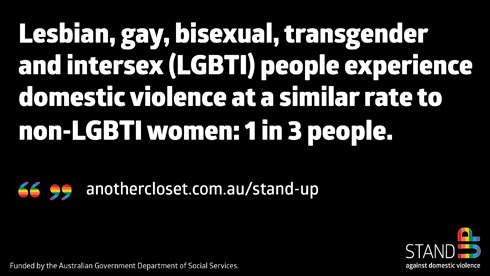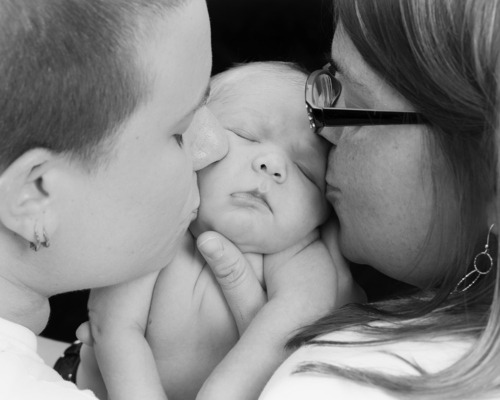My beautiful cousin Alicia (left) is an awesome person. She is smart as hell, funny and kind. She is studying at university, working and is a proud indigenous woman. She is also in a committed and loving relationship with her partner, Naomi (right)- I spoke to them a while ago on the subject of marriage equality. Like many people, Alicia left the small country town she grew up in to live elsewhere and study but still likes to keep up with the local news. So you can imagine her feelings on reading this opinion piece in the Area News. A similar piece was also published in Wagga’s Daily Advertiser written by the same Catholic priest.

It was published in response to another opinion piece by Monique Patterson, who interviewed a same sex couple raising a child together who question why their marriage is not recognised by Australian law.
The good Father appears to take issue with the entire argument supporting a person’s right to be homosexual. I would like to respond to his “opinions” and “facts”, as the Father professes himself to be a big fan of facts and it would appear that the ones he used in his writing are a bit out of whack, to say the least.
Firstly, he accuses the other writer and the local news of trying to “trick” readers into believing that same gender marriage is normal. Let’s look at the definition of “normal”. It means conforming to a standard- usual, expected or typical. Now, how can gay marriage be normal when it’s not legal? You can’t very well expect gay couples to be “normal” when their union can’t legally proceed to the next expected or typical step. So the good Father is correct- it’s not yet normal here in Australia (though here is a list of places where same sex marriage is legally performed, recognised or about to become legal) That is in fact a part of why we NEED to legalise same sex marriage in Australia- it would certainly go a long way towards normalising said marriages and that would certainly be a good thing, since many agree that not allowing persons to marry on the basis of their orientation is regarded as a violation of their basic human rights. Hardly a surreptitious attempt to trick anyone, Padre.
Father Rafter goes on to make a list of what he says are facts to support his position. The first is that there is no scientific evidence to support the idea that same sex attraction is something you are born with. Now, I know that there actually is some evidence in this regard (here is one good article on the subject) but let’s assume, for argument’s sake, that the Father is correct. Taking into account what I know about the Father who wrote this, he is a bonafide Catholic, endorsed by the Catholic church as a priest. Doesn’t get much more Catholic that that, right? Is there a scientific study conclusively showing that some people are born Catholic? Some genetic predisposition towards Catholicism, perhaps? No, I don’t believe there is. Is this a good reason to tell people that they should refrain from, er… being Catholic? Catholicism, like any religion, is a lifestyle choice- just like Father Rafter seems to be arguing that homosexuality is.
Father Rafter then mentions that HIV is at a 20 year high with the most common rate of transmission being unprotected sex between males. This is true- but let’s expand on this a little. While 67% of the new diagnoses were applied to men who have sex with other men, 25% were attributed to heterosexual men. This number is also rising. Is this evidence that heterosexuality is also abnormal and that heterosexual couples should not be allowed to marry? I don’t think so, no. What it does show is that HIV is not a problem only faced by the gay community. Professor de Wit, who co-authored the report the Father appears to have gotten his figures from, is the Director of the National Centre in HIV research is quoted as saying the most at risk men (namely young, gay men) are also “less likely to have been exposed to HIV prevention” so it would seem that the problem is education based and not, perhaps, solely orientation based as Father Rafter implies.
Father Rafter also states that US based research by a Dr Patrick Sullivan shows that 20% of gay men in a study are HIV positive. I eventually located some information on this study and again, I think the Father is being a little vague on details here as the figures he quoted are pretty alarming when read in isolation. It would appear that yes, the figures he quoted were correct, however he failed to mention this salient point- that the study group was only 194 men. So a reasonable, but by no means enormous, sample group. There is also one other really important detail Father Rafter has ignored- the study drew their sample group thorough an organisation called AID Atlanta, which is an HIV service organisation. Due to this, the researchers pointed out that “the results cannot be generalised to other couples.”and“the findings are preliminary”and the study is ongoing.
I think it’s evident that Father Rafter has cherry-picked available research (and ignored quite a bit of it too) to support his argument. The solution that the Father implies is “Don’t be gay, stop being gay!” This just isn’t an acceptable, ethical or practical solution. It wouldn’t be as effective, in my humble opinion, as a targeted drive to educate all Australians on HIV prevention. Start in schools, advertise on television and online, provide information to new migrants (who are also a big at-risk group if they are from Sub-Saharan Africa or Southeast Asia, according to this report) After all, sexual orientation is a part of who we are- and you can’t just stop being who you are, right?
In his writings, Father Rafter mentions that there is a higher rate of depression and anxiety particularly in homosexual men and also mentions an increase in substance abuse, mood disorders and an increased use of mental health services. I can’t help but wonder how the Father would propose to address these issues? Since he reminds us that the Catholic Church is against homosexuality, I can only assume his solution to all these issues is not to stop the persecution and discrimination experienced by many in the LGBTI community but again to tell them to stop being gay- essentially blaming the victims. Perhaps if all facets of the community exercised unconditional tolerance and respect towards members of the LGTBI community, this would be a step towards remedying these issues? Again, this sort of education needs to begin early. I recently read here that LGBTI people experience a higher prevalence of risk factors for suicide than other members of the community including social isolation, with a much higher proportion of this occurring in schools. These numbers were drawn from this survey of all up 1749 young people.
Father Rafter might also do well to listen to the comments of Pope Francis, who said earlier this year that the issue of same sex marriage should be looked into and studied, not dismissed. He also reportedly reached out to gay people, saying they should neither be marginalised or excluded from the priesthood. The Pope’s views still reflect the position of the church, of course, but he seems to be a bit more modern, open and tolerant than Father Rafter comes across in his articles- in my humble opinion, of course.
Father Rafter then says that the gay community has a high level of domestic violence within same-sex relationships. However:

I’m not able to see where Father Rafter got his “facts” from in this instance. Maybe his facts relate to another country? Another small study group not intended to reflect the general population? I don’t know. I do note, however, that here is Australia, they aren’t correct. Intimate partner or domestic violence does not discriminate and occurs in all sorts of relationships, across all socio-economic groups and all cultures. It is not a gay problem or a Christian problem but a societal one that sorely needs to be addressed across the entire spectrum of groups within our community.
Father Rafter then says :
“The American Psychological Association (APA) suggests that the reason there is violence and discrimination within the gay community is because they are unaccepted and persecuted.”
Yes. They do say that and I, for one, absolutely believe this to be true. I don’t think he believes it to be true, judging from the tone of his articles, but if I am wrong, I will happily retract that.
Then he goes on to make what I can only label a Strawman argument. He says that Christians experienced and do still experience persecution for their religious beliefs. Ok, yep, I agree. Then he said this has not necessarily lead to domestic violence within Christian marriages. Okay…I’ve never heard anyone say that it did. So, where does the problem of intimate partner violence within Christian marriages come from, then? Because it certainly exists. You can read more on that subject here, here, here and here. From what I can tell, Christian people experience domestic violence at much the same rate as anyone else does. No one claims that persecution leads to intimate partner violence in Christian OR homosexual relationships that I am aware of.
Father Rafter also says the idea that LGBTI domestic or intimate partner violence will somehow vanish if same sex marriage is legalised is an objectionable one, and I agree. I mean, marriage has hardly eradicated domestic violence among heterosexual couples, why would it work in same sex ones? I should point out, though, that I personally have never seen this justification for same sex marriage raised by anyone, except, of course, for Father Rafter. I googled a number of variations to his statement to this effect and couldn’t get a hit anywhere making such claims- except for the Father’s articles.
Father Rafter then reiterates the false statement regarding high levels of violence between same sex couples in “gay friendly” areas and then mentions an American survey where 100% of homosexual respondents (and I quote) “had been unfaithful to their partner”. Again, perspective and accuracy are needed here. This survey was conducted on 3000 adults. Of those 3000 randomly selected adults, less than 3% identified as gay, lesbian or bisexual. My high school maths puts 3% at 90 people. So less than 90 people in one survey in one country. Father Rafter says that all of them admitted to being unfaithful, but that is incorrect. It actually says that 100% of gay people surveyed experienced infidelity in their relationships. That doesn’t mean all gay people surveyed were unfaithful. He’s also ignoring infidelity among heterosexual people. This article, from earlier this year, discusses a website set up for married people to seek affairs. Australia has over 910,000 members. That’s not to say all of them are being unfaithful- but I think it’s fair to say they’ve all considered it! This study, put together by the Australian Institute of Families, looks at reasons for divorce among heterosexual couples, and 20% of respondents cited infidelity. The study involved 650 people, so 130 of them had experienced infidelity. My point is, heterosexual couples are hardly immune to infidelity- even Catholics- so using infidelity as an argument against same sex marriage doesn’t add up.
Father Rafter then implies these issues are not being addressed and that we are being told we should redefine marriage and allow children to be “brought into this lifestyle”. So far, research is showing that children being raised by same sex parents are doing pretty bloody well, actually. There has been no credible research that suggests otherwise.
Father Rafter takes the opportunity to remind readers that the Catholic position towards persons with same gender attraction is to be ‘sensitive, compassionate and respectful’ while also reiterating that acting on such attraction is a violation of the 6th commandment.
I think it’s a terrible shame that Father Rafter did not adopt the sensitive, compassionate and respectful approach to this topic that his own faith recommends. He says he likes facts, while misrepresenting them, misconstruing them, ignoring them and even making them up to marginalise a whole community in his efforts to continue to deny them a basic right. This is not showing sensitivity. This does not demonstrate compassion. This is not respectful.
Linking up with With Some Grace for FYBYF


